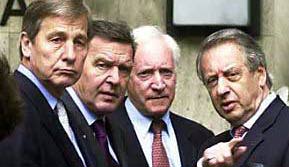 An
Interior Ministry official
mentioned the agreement in
passing during a phone
conversation with a judge last
week... An
Interior Ministry official
mentioned the agreement in
passing during a phone
conversation with a judge last
week... -- That is how it is normally
fixed in modern Germany --
phone conversations between
ministry officials and
judges.
-- That is how it is normally
fixed in modern Germany --
phone conversations between
ministry officials and
judges.
|
[images added by this website]
Thursday, January 24, 2002; Page A17 Germany Hurt in
Efforts to Ban Neo-Nazis Court
Suspends Case Against Party After Learning
Leader Was Government Spy By Peter Finn
Washington Post Foreign Service BERLIN, Jan. 23 -- The
German government's effort to persuade a
court to ban a neo-Nazi party was
seriously compromised this week by
disclosures that a senior party member
whose racist statements were a key part of
the case had been a paid government
informant. Officials at the Federal Constitutional
Court had accepted the case, with hearings
scheduled to begin Feb. 5, partly on the
basis of statements by the informant,
Wolfgang Frenz. But the government
never told the court that he was formerly
on the payroll of the Office for the
Protection of the Constitution. Now the court has suspended the Feb. 5
hearing, and legislators and court
officials said the court could throw out
the government's petition to ban the
National Democratic Party, a petition
submitted only after a vote of both houses
of Parliament and cabinet approval last
year. "The judges are very angry," said
one court official, who asked not to be
identified.  As
a tool against a Nazi revival, German law
allows the court-ordered banning of
parties that are deemed extremist. After a
surge in racist violence in 2000, the
government of Chancellor Gerhard
Schroeder
(right, with Jewish
leaders) decided to go after the
NPD, as the party is known in Germany,
this way. Only two parties, both
far-rightist, have been banned in the
history of the federal republic. As
a tool against a Nazi revival, German law
allows the court-ordered banning of
parties that are deemed extremist. After a
surge in racist violence in 2000, the
government of Chancellor Gerhard
Schroeder
(right, with Jewish
leaders) decided to go after the
NPD, as the party is known in Germany,
this way. Only two parties, both
far-rightist, have been banned in the
history of the federal republic.
"It's inexcusable that the NPD could
survive this important effort to ban it,"
Michel Friedman, vice president of
Germany's Central Council of Jews, told
German radio. In an editorial today, the
Frankfurter Allgemeine Zeitung
newspaper said the government looked
"idiotic" and its conduct was
"grotesque." The government said its plant within
the party made statements cited in
government legal briefs after the German
intelligence agency had severed its
relationship with him. But Frenz still
needed government permission to testify
because of a confidentiality agreement he
had signed with the agency. An Interior
Ministry official mentioned the
agreement in passing during a phone
conversation with a judge last week,
but then failed to follow the judge's
request that the matter be immediately
reported to the court in writing.
Angered, the judges then suspended the
Feb. 5 hearing and gave no indication that
they would hold it at a later date. In a statement, the court, the
country's highest, said the issue "raises
procedural and material questions of law
that cannot be cleared up before the court
date." "There were serious failures,"
acknowledged Interior Minister Otto
Schily at a news conference today,
adding that ministry officials believed
that because Frenz had not been on the
government's payroll since 1995 they
didn't have to reveal that he had been an
informant. Schily said that Frenz had been dropped
after his public statements became
increasingly shrill. But government
officials then used those racist
statements to persuade the court last
October to take the case seeking the NPD's
ban. Frenz, 66, a co-founder and former
executive member of the 6,500-strong NPD,
told the German press today that he was
paid about $400 every two weeks for
reports on the party. He said he paid
taxes on the money and then gave the
balance to the NPD, which, if true, means
the country's domestic intelligence agency
was indirectly subsidizing one of its
principal enemies. © 2002
The Washington Post
Company |